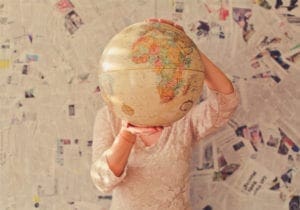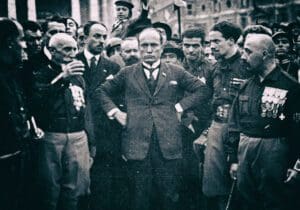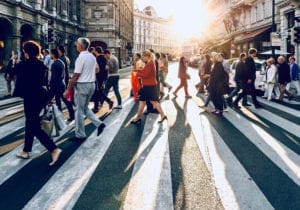
Le persone, intese come il genere umano nella sua totalità, sono un’insieme di tante idee, credenze, religioni e modi di vivere. Un agglomerato di differenze che se viste da lontano sono in realtà un’unica cosa: l’umanità.
Ma quali sono le sfide, i sogni, i comportamenti e le speranze che ci riguardano tutti?
Qui di seguito una raccolta delle più belle frasi sulle persone, sugli uomini e sull’umanità (in inglese e italiano) che ci faranno riflettere sul mondo e su noi stessi. Eccole!
Aforismi, citazioni e frasi sulle persone, sugli uomini e sull’umanità in inglese (con traduzione)
- I do not want people to be very agreeable, as it saves me the trouble of liking them a great deal.
Non voglio che la gente sia troppo simpatica: questo mi risparmia il disturbo di volerle molto bene.
(Jane Austen) - The world is a dangerous place to live, not because of the people who are evil, but because of the people who don’t do anything about it.
Il mondo è un posto pericoloso; non a causa di quelli che compiono azioni malvagie, ma per quelli che osservano senza fare nulla.
(Albert Einstein) 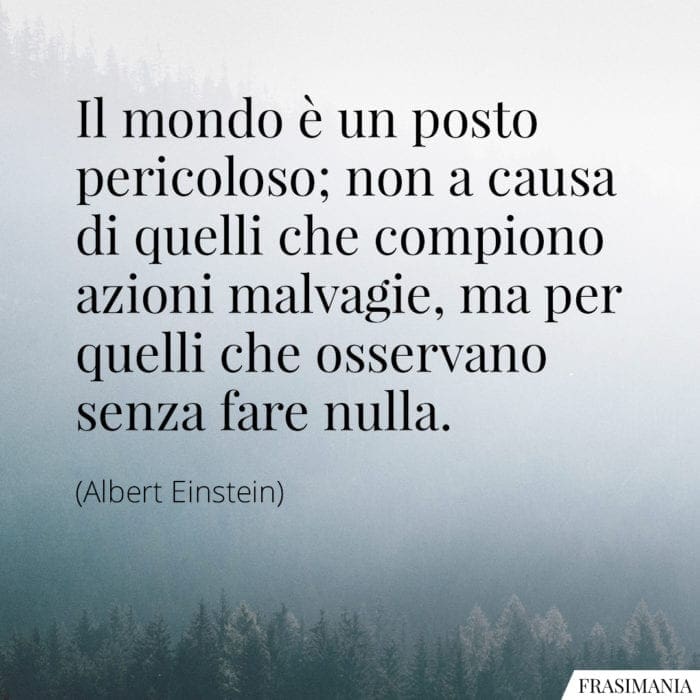
- There are multitudes of people, but there are many more faces, because each person has several of them.
Ci sono molte persone nel mondo, ma ci sono ancora più volti, perché ognuno ne ha diversi.
(Rainer Maria Rilke) - History is indeed little more than the register of the crimes, follies, and misfortunes of mankind.
La storia è, in effetti, poco più che il registro dei crimini, delle follie e della disgrazia dell’umanità.
(Edward Gibbon) - The world has enough for everyone’s need, but not enough for everyone’s greed.
Nel mondo c’è quanto basta per le necessità dell’uomo, ma non per la sua avidità.
(Mahatma Gandhi) 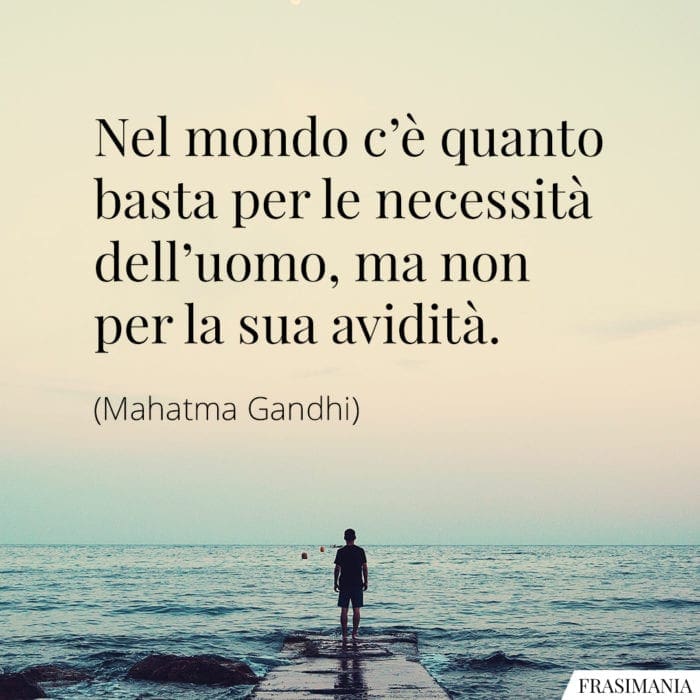
- All men are frauds. The only difference between them is that some admit it. I myself deny it.
Tutti gli uomini sono degli imbroglioni. L’unica differenza tra loro è che alcuni lo ammettono. Io stesso lo nego.
(Henry Louis Mencken) - Five percent of the people think; ten percent of the people think they think; and the other eighty-five percent would rather die than think.
Il cinque percento delle persone pensa; il dieci per cento delle persone crede di pensare; e l’altro ottantacinque percento preferirebbe morire piuttosto che pensare.
(Thomas Edison) - The trouble with the world is that the stupid are cocksure and the intelligent are full of doubt.
Il problema dell’umanità è che gli stupidi sono strasicuri, mentre gli intelligenti sono pieni di dubbi.
(Bertrand Russell) 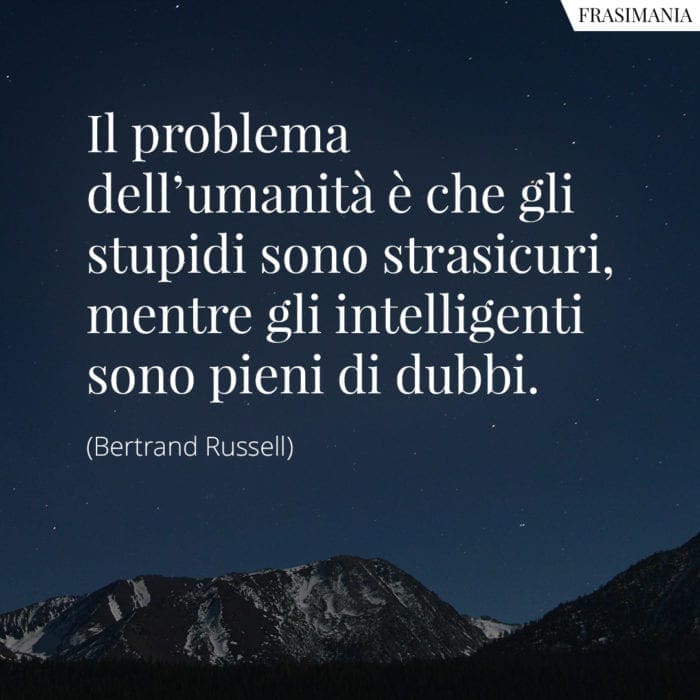
- People are very inclined to set moral standards for others.
Le persone sono molto inclini a stabilire gli standard morali degli altri.
(Ralph Waldo Emerson) - You can easily judge the character of a man by how he treats those who can do nothing for him.
Puoi facilmente giudicare il carattere di un uomo da come tratta coloro che non possono far niente per lui.
(Johann Wolfgang von Goethe) 
- We are just an advanced breed of monkeys on a minor planet of a very average star. But we can understand the Universe. That makes us something very special.
Siamo solo una specie evoluta di scimmie su un pianeta minore di una stella media. Ma siamo in grado di capire l’universo. Questo ci rende qualcosa di molto speciale.
(Stephen Hawking) - The fate of the world will be such as the world deserves.
L’umanità avrà la sorte che saprà meritarsi.
(Albert Einstein) 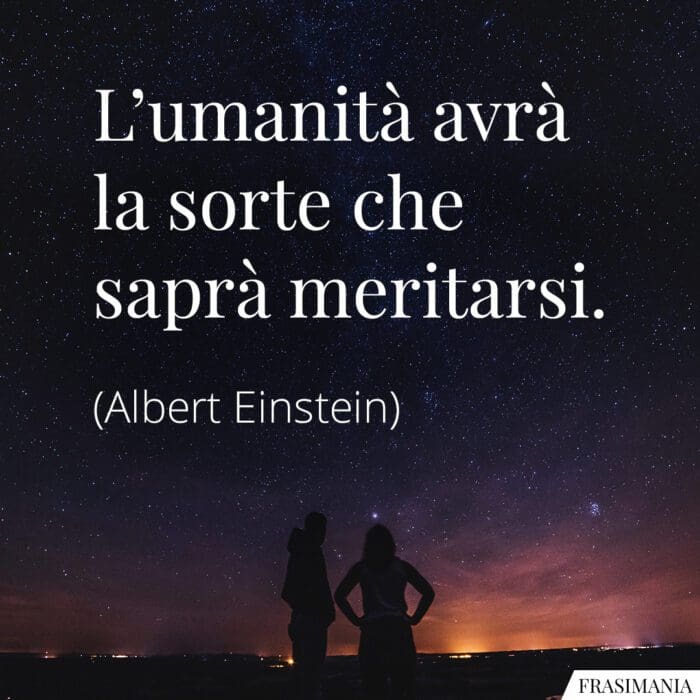
- There are only the pursued, the pursuing, the busy and the tired.
Ci sono solo gli inseguiti e gli inseguitori, gli indaffarati e gli stanchi.
(Francis Scott Fitzgerald) - I have no faith in human perfectibility. I think that human exertion will have no appreciable effect upon humanity. Man is now only more active – not more happy – nor more wise, than he was 6000 years ago.
Non ho fiducia nella perfettibilità umana. Penso che lo sforzo umano non avrà alcun effetto apprezzabile sull’umanità. L’uomo è ora solo più attivo – non più felice – non più saggio, di quanto lo fosse 6000 anni fa.
(Edgar Allan Poe) - Never doubt that a small group of thoughtful, committed, citizens can change the world. Indeed, it is the only thing that ever has.
Non dubitare mai che un piccolo gruppo di cittadini coscienziosi e impegnati possa cambiare il mondo. In effetti, è l’unica cosa che è sempre accaduta.
(Margaret Mead) 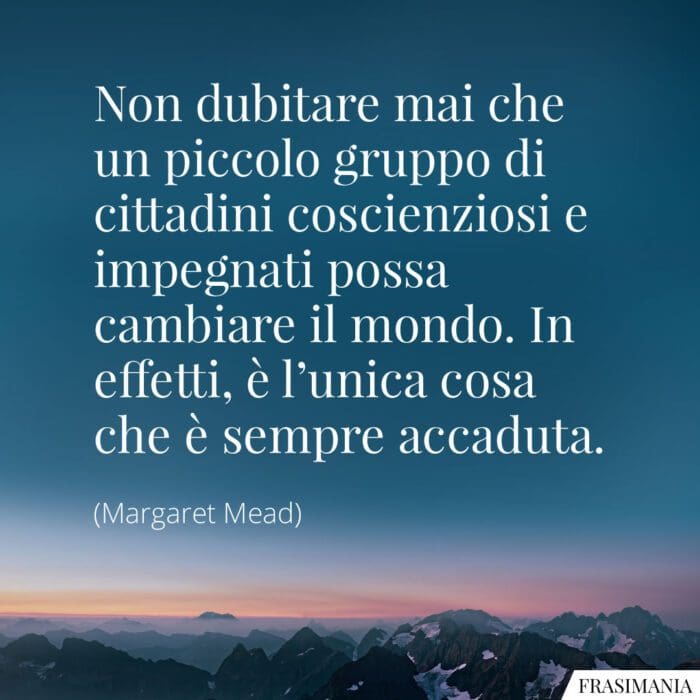
- Love and compassion are necessities, not luxuries. Without them humanity cannot survive.
Amore e compassione sono necessità, non lussi. Senza di loro l’umanità non può sopravvivere.
(Dalai Lama) - Men do not know how to appreciate and measure luck except that of others. Their own never.
Gli uomini non sanno apprezzare e misurare che la fortuna degli altri. La propria, mai.
(Indro Montanelli) 
- In the part of this universe that we know there is great injustice, and often the good suffer, and often the wicked prosper, and one hardly knows which of those is the more annoying.
Nella parte conosciuta di questo universo c’è una grande ingiustizia: spesso i buoni soffrono, mentre i malvagi prosperano, e si fa fatica a dire quale di queste due realtà sia la peggiore.
(Bertrand Russell) - I love mankind… it’s people I can’t stand!
Io amo l’umanità… è la gente che non sopporto!
(Charles M. Schulz) - There are two different types of people in the world, those who want to know, and those who want to believe.
Esistono due diversi tipi di persone nel mondo, quelli che vogliono sapere, e quelli che vogliono credere.
(Friedrich Nietzsche) 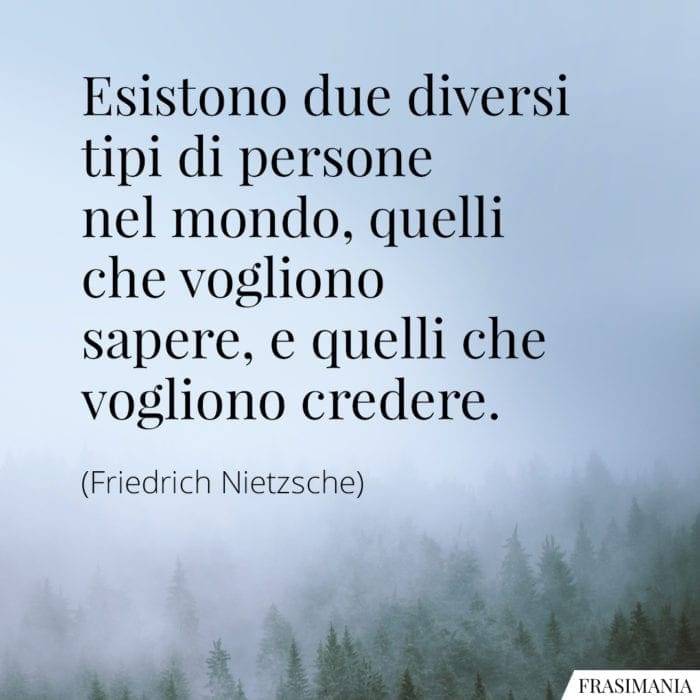
- The fate of the world will be such as the world deserves.
Il destino del mondo sarà quello che il mondo merita.
(Albert Einstein) - Keep away from people who try to belittle your ambitions. Small people always do that, but the really great make you feel that you, too, can become great.
Stai lontano dalle persone che cercano di sminuire le tue ambizioni. Le persone piccole lo fanno sempre, ma quelle veramente grandi ti fanno sentire che anche tu puoi diventare grande.
(Mark Twain) 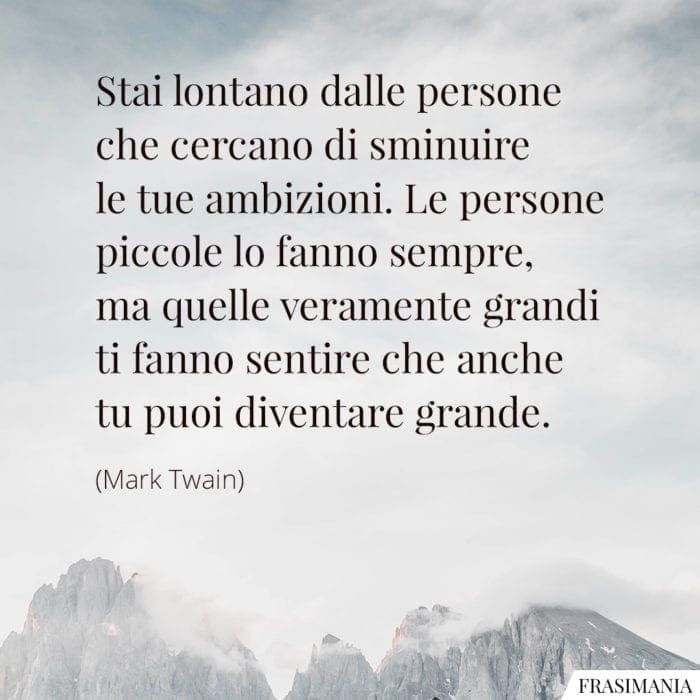
- Whatever is my right as a man is also the right of another; and it becomes my duty to guarantee as well as to possess.
Qualunque cosa sia mio diritto in quanto essere umano è anche un diritto degli altri; ed è mio dovere garantirlo così come averlo.
(Thomas Paine) - Men are anxious to improve their circumstances, but are unwilling to improve themselves.
Gli uomini sono ansiosi di migliorare le proprie condizioni, ma non vogliono saperne di migliorare se stessi.
(James Allen) - They say there’s enough religion in the world to make men hate each other, but not enough to make them love.
Si dice che al mondo ci sia tanta religione per far sì che gli uomini si odino, ma non abbastanza perché gli uomini si amino.
(Dal Film “Angel Heart”) 
- The only normal people are the ones you don’t know very well.
Le uniche persone normali sono quelle che non conosci molto bene.
(Alfred Adler) - The value of a man should be seen in what he gives and not in what he is able to receive.
Il valore di una persona risiede in ciò che è capace di dare e non in ciò che è capace di prendere.
(Albert Einstein) 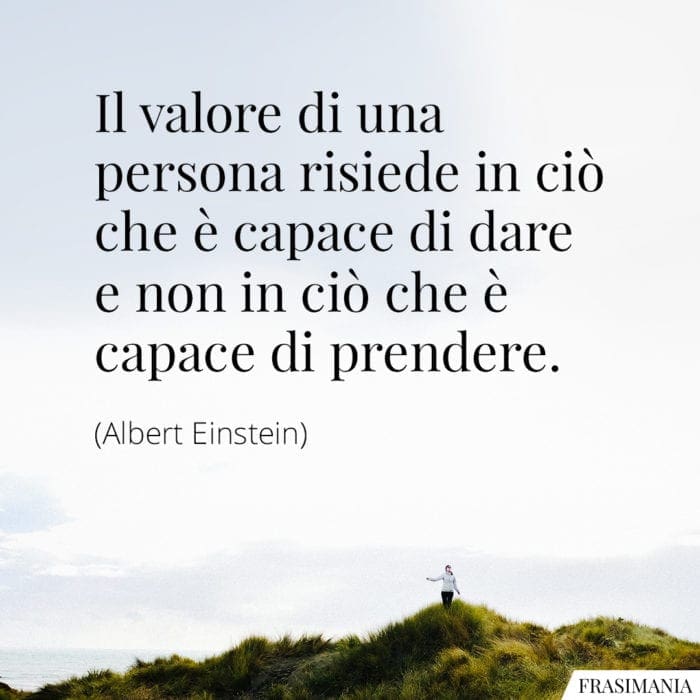
- This is the stuff we’re made of, half indifference and half malice.
È di questa pasta che siamo fatti: metà indifferenza e metà cattiveria.
(José Saramago) - Man is a creature that can get accustomed to anything, and I think that is the best definition of him.
Un essere che si abitua a tutto: penso che questa sia la migliore definizione che si possa dare all’uomo.
(Fëdor Dostoevskij) - Every child comes with the message that God is not yet discouraged of man.
Ogni bambino che nasce ci ricorda che Dio non ha ancora perso le speranze nell’umanità.
(Rabindranath Tagore) 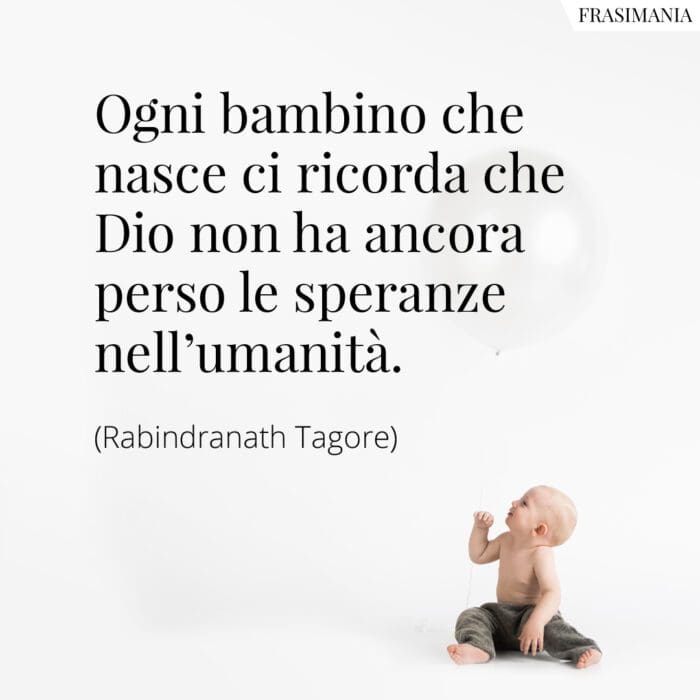
- Man is the cruelest enemy of man.
Il nemico più crudele dell’uomo è l’uomo.
(Johann Gottlieb Fichte) - All the world’s a stage.
Tutto il mondo è un palcoscenico.
(William Shakespeare) 
- All the world’s a stage, znd all the men and women merely players: They have their exists and their entrances; And one man in his time plays many parts.
Tutto il mondo è un palcoscenico, e gli uomini e le donne sono soltanto attori; hanno le loro uscite e le loro entrate in scena; e ciascuno, per il tempo che gli è stato assegnato, recita molte parti.
(William Shakespeare) - One sees more devils than vast hell can hold.
Si vedono più diavoli di quanti ne possa contenerne l’inferno.
(William Shakespeare) 
- Too many people spend money they haven’t earned, to buy things they don’t want, to impress people that they don’t like.
Troppa gente spende soldi che non ha guadagnato, comprando cose che non vuole, per impressionare gente che non gli piace.
(Will Rogers) - A people that elect corrupt politicians, imposters, thieves and traitors are not victims, but accomplices.
Un popolo che elegge corrotti, impostori, ladri e traditori, non è vittima, ma complice.
(George Orwell) 
- People don’t like to think, if one thinks, one must reach conclusions. Conclusions are not always pleasant.
La gente non ama pensare. Se uno pensa, deve poi giungere a delle conclusioni. E le conclusioni non sempre sono piacevoli.
(Helen Keller) - Until man learns to respect and speak to the animal world, he can never know his true role on Earth.
Fin quando l’uomo non avrà imparato a rispettare e a dialogare con il mondo animale, non potrà mai conoscere il suo vero ruolo su questa Terra.
(Enzo Maiorca) 
- Paradise is too perfect for humanity.
Il paradiso è troppo perfetto per l’umanità.
(Dario Argento) - Human it is to have compassion on the afflicted.
Umana cosa è l’avere compassione degli afflitti.
(Giovanni Boccaccio) 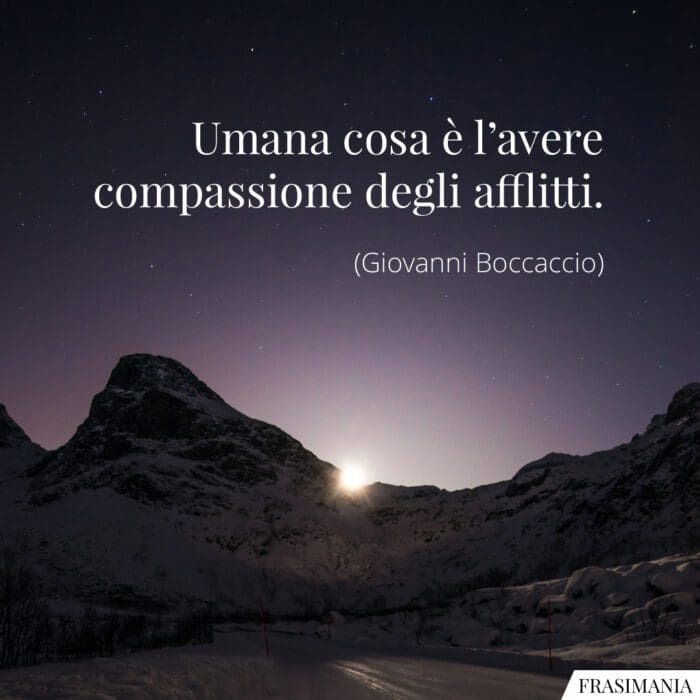
- If civilization is to survive, we must cultivate the science of human relationships – the ability of all peoples, of all kinds, to live together, in the same world at peace.
Se la civiltà è sopravvivere, dobbiamo coltivare la scienza delle relazioni umane: la capacità di tutti i popoli, di ogni tipo, di vivere insieme nello stesso mondo, in pace.
(Franklin D. Roosevelt) - To live is the rarest thing in the world. Most people exist, that is all.
Vivere è la cosa più rara al mondo. La maggior parte delle persone esiste, questo è tutto.
(Oscar Wilde) 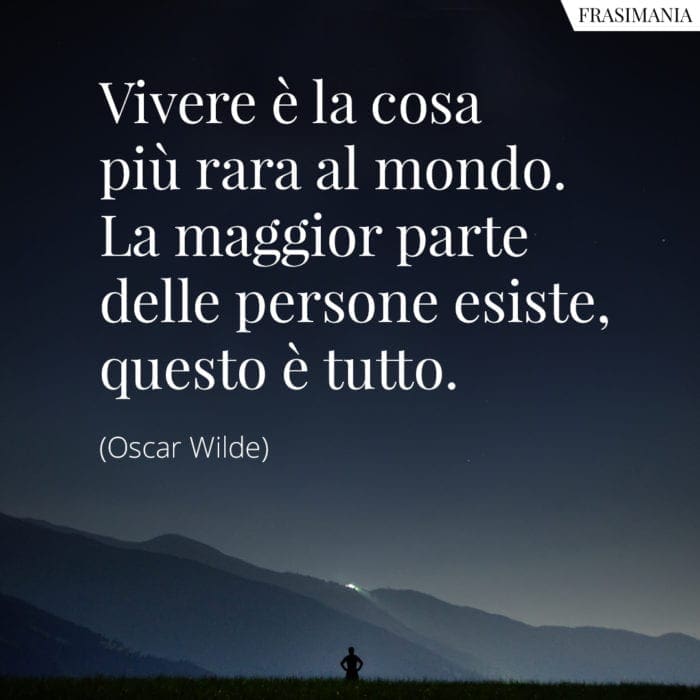
- I feel that there is nothing more truly artistic than to love people.
Sento che non c’è niente di più artistico che amare le persone.
(Vincent van Gogh) - It is easier to build strong children than to repair broken men.
È più facile costruire bambini forti che riparare uomini guasti.
(Frederick Douglass) 
- The Bible tells us to love our neighbors, and also to love our enemies; probably because generally they are the same people.
La Bibbia ci dice di amare i nostri vicini di casa, ed anche di amare i nostri nemici. Probabilmente perché spesso si tratta delle stesse persone.
(Gilbert Keith Chesterton) - People demand freedom of speech as a compensation for the freedom of thought which they seldom use.
Le persone chiedono la libertà di parola come compensazione per la libertà di pensiero che raramente usano.
(Søren Kierkegaard) - Thinking is difficult, that’s why most people judge.
Pensare è difficile. Per questo la maggior parte della gente giudica.
(Carl Gustav Jung) 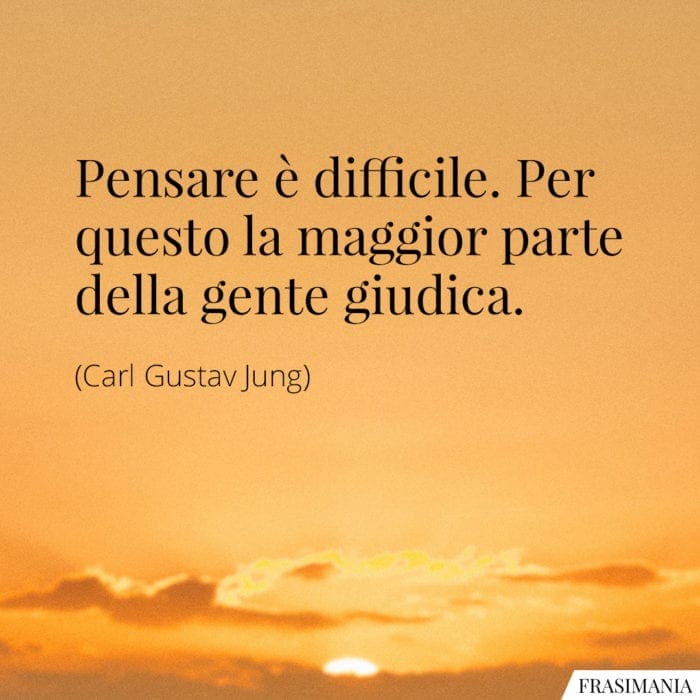
- People hate as they love, unreasonably.
Le persone odiano come amano, irrazionalmente.
(William Makepeace Thackeray) - Many people lose the small joys in the hope for the big happiness.
Molte persone si perdono le piccole gioie nella speranza della grande felicità.
(Pearl S. Buck) 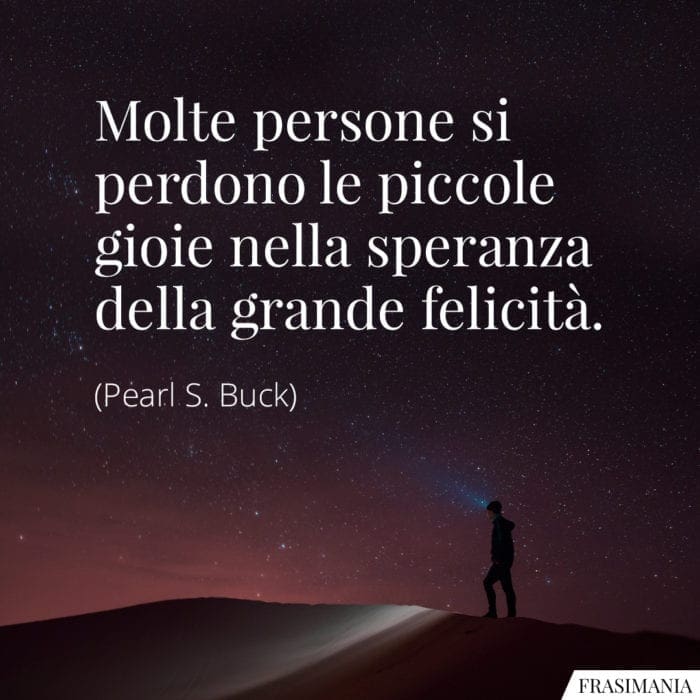
- The more I learn about people, the more I like my dog.
Più conosco le persone, più mi piace il mio cane.
(Mark Twain) - My humanity is bound up in yours, for we can only be human together.
La mia umanità è legata alla tua, perché possiamo essere umani insieme.
(Desmond Tutu) - There are people who know everything, and unfortunately that’s all they know.
Ci sono persone che sanno tutto e purtroppo è tutto quello che sanno.
(Oscar Wilde) 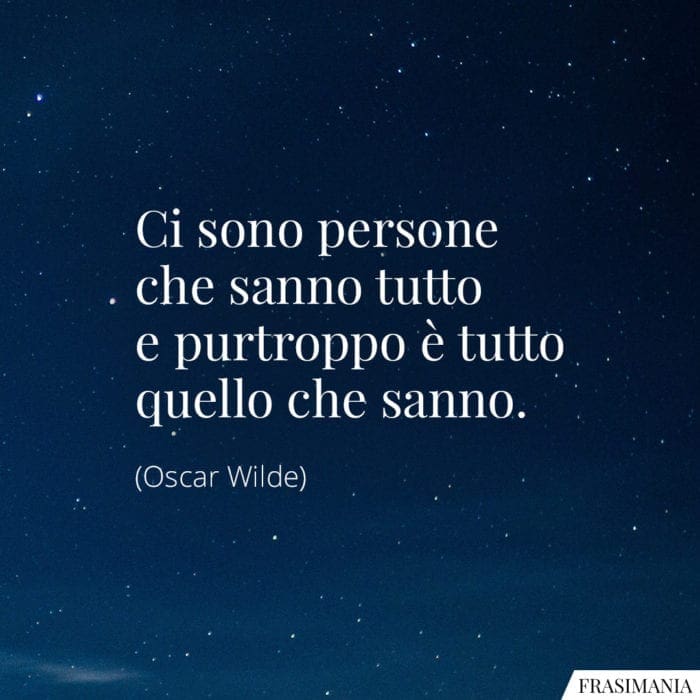
- With people of limited ability modesty is merely honesty. But with those who possess great talent it is hypocrisy.
Nelle persone di capacità limitate la modestia è semplice onestà, ma in chi possiede un grande talento è ipocrisia.
(Arthur Schopenhauer) - I fear the day that technology will surpass our human interaction. The world will have a generation of idiots.
Temo il giorno in cui la tecnologia andrà oltre la nostra umanità: il mondo sarà popolato allora da una generazione di idioti.
(Albert Einstein) 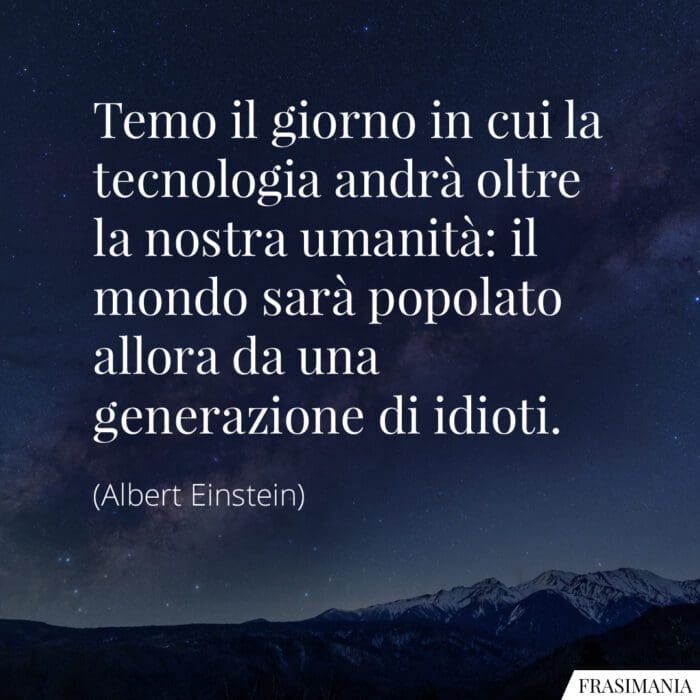
- Without love humanity could not exist for a day.
Senza amore, l’umanità non sopravvivrebbe un solo giorno.
(Erich Fromm) - Men are more moral than they think and far more immoral than they can imagine.
Gli uomini sono più moralisti di quanto pensano e molto più immorali di quanto possano immaginare.
(Sigmund Freud) 
- Act in such a way that you treat humanity, whether in your own person or in the person of any other, never merely as a means to an end, but always at the same time as an end.
Agisci in modo da trattare l’umanità, sia nella tua persona sia in quella di ogni altro, sempre anche come fine e mai semplicemente come mezzo.
(Immanuel Kant) - We don’t have to judge the merit of a man by his great qualities, but by what he knows to do.
Non si deve giudicare il valore di un uomo dalle sue grandi qualità, ma dall’uso che sa farne.
(François de la Rochefoucauld) - Children find everything in nothing, men find nothing in everything.
I fanciulli trovano il tutto nel nulla, gli uomini il nulla nel tutto.
(Giacomo Leopardi) 
- The human heart has hidden treasures, in secret kept, in silence sealed; the thoughts, the hopes, the dreams, the pleasures, whose charms were broken if revealed.
Il cuore umano ha tesori nascosti, custoditi in segreto, sigillati in silenzio; i pensieri, le speranze, i sogni, i piaceri, il cui fascino si distrugge se rivelati.
(Charlotte Brontë) - Therefore, because I see so many weak ones trodden down, I greatly doubt the sincerity of much of what is called progress and civilization.
Quindi, dato che vedo tanti deboli calpestati, dubito molto della sincerità di quel che viene chiamato progresso e civiltà.
(Vincent van Gogh) 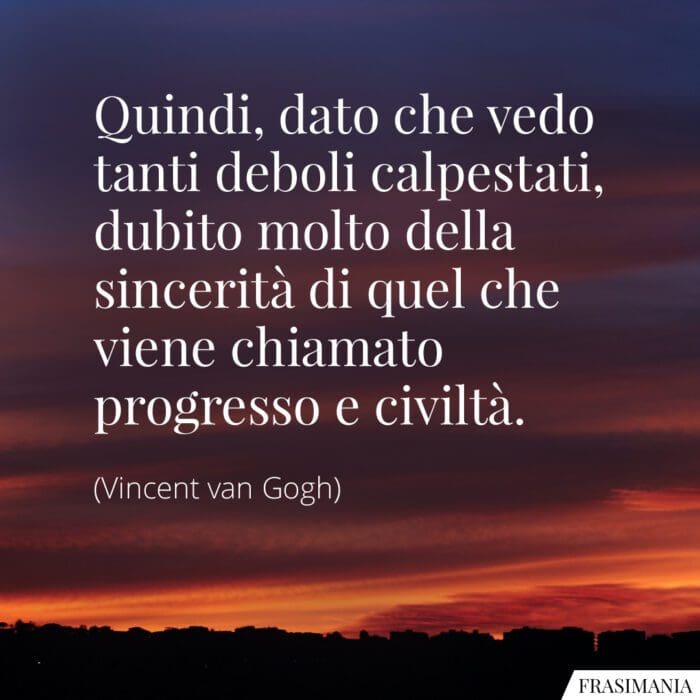
- We become not a melting pot, but a beautiful mosaic. Different people, different beliefs, different yearnings, different hopes, different dreams.
Non siamo un melting pot, ma un bellissimo mosaico. Persone diverse, credenze diverse, desideri diversi, speranze diverse, sogni diversi.
(Jimmy Carter) - Difficulties break some men, but make others.
Le difficoltà spezzano alcuni uomini, ma ne rafforzano altri.
(Nelson Mandela) 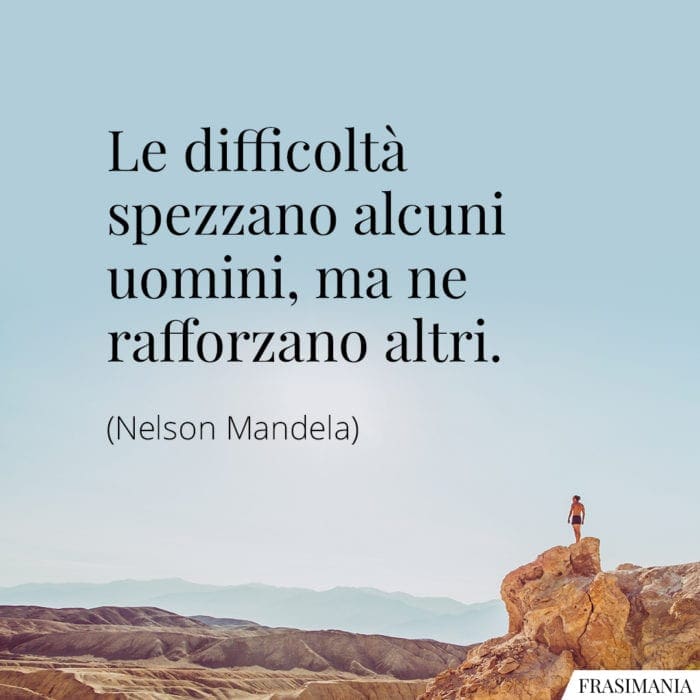
- Only great men have great faults.
Soltanto i grandi uomini possono avere grandi difetti.
(François de La Rochefoucauld) - Bad men need nothing more to compass their ends, than that good men should look on and do nothing.
Gli uomini malvagi non hanno bisogno che di una cosa per raggiungere i loro scopi, cioè che gli uomini buoni guardino e non facciano nulla.
(John Stuart Mill) - Our true nationality is mankind.
La nostra vera nazionalità è l’umanità.
(H. G. Wells) 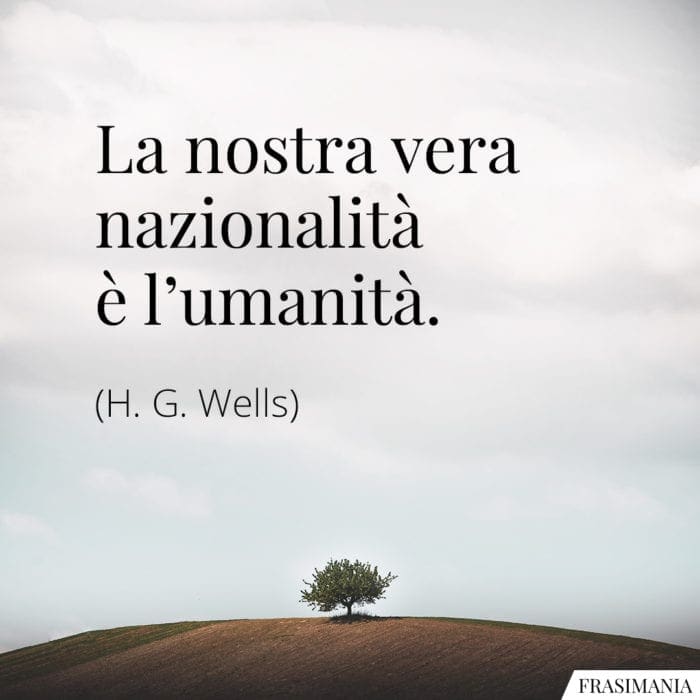
- Men have no more time to understand anything. They buy things all ready made at the shops. But there is no shop anywhere where one can buy friendship, and so men have no friends any more.
Gli uomini non hanno più tempo per conoscere nulla. Comprano dai mercati le cose già fatte. Ma siccome non esistono mercati di amici, gli uomini non hanno più amici.
(Antoine de Saint-Exupéry) - Neighbor: one whom we are commanded to love as ourselves, and who does all he knows how to make us disobedient.
Prossimo: colui che ci viene ordinato di amare come noi stessi e che fa di tutto per farci disubbidire.
(Ambrose Bierce) - The public have an insatiable curiosity to know everything, except what is worth knowing.
La gente ha un’insaziabile curiosità di conoscere tutto, tranne ciò che vale la pena sapere.
(Oscar Wilde) 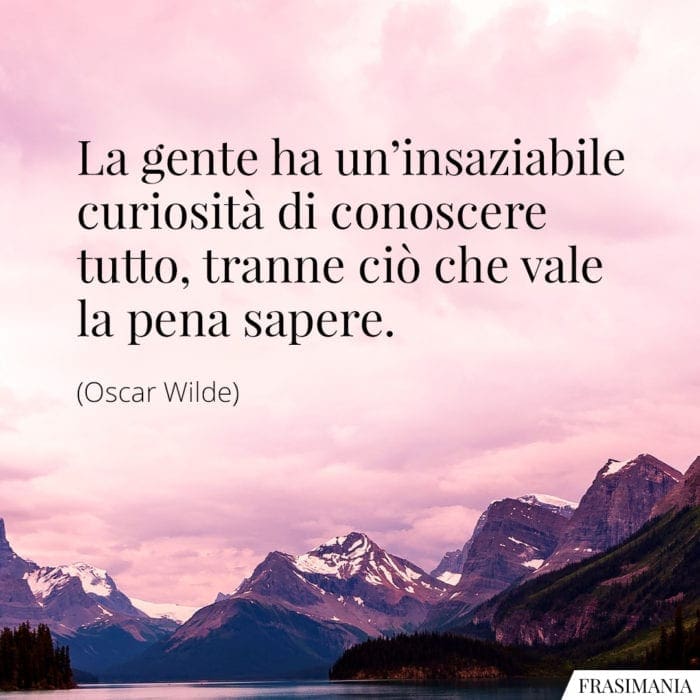
- I wonder who it was defined man as a rational animal. It was the most premature definition ever given.
Chissà chi definì l’uomo un animale razionale. Fu la più affrettata delle definizioni.
(Oscar Wilde) - I can calculate the motion of heavenly bodies but not the madness of people.
Posso calcolare il movimento dei corpi celesti, ma non la follia della gente.
(Isaac Newton) - You cannot save people. You can only love them.
Non puoi salvare le persone. Puoi solo amarle.
(Anaïs Nin) 
- The inhabitants of the earth are of two sorts: those with brains, but no religion, and those with religion, but no brains.
Gli abitanti della Terra si dividono in due categorie: quelli con il cervello ma senza religione, e quelli con la religione ma senza cervello.
(Al-Ma’arri) - The essence of a man is found in his faults.
L’essenza di un uomo si trova nei suoi difetti.
(Francis Picabia) 
- A great many people think they are thinking when they are merely rearranging their prejudices.
Molte persone credono di pensare mentre stanno semplicemente riordinando i loro pregiudizi.
(William James) - It’s only the futility of the first flood that prevents God from sending a second.
Soltanto l’inutilità del primo diluvio trattiene Dio dal mandarne un secondo.
(Sébastien-Roch Nicolas de Chamfort) 
- If you want to tell people the truth, make them laugh, otherwise they’ll kill you.
Se vuoi dire la verità alla gente, falla ridere, altrimenti ti uccideranno.
(George Bernard Shaw) - When one is happy with himself he loves humanity.
Quando uno è contento di se stesso ama l’umanità.
(Luigi Pirandello) - People cling to the habit as a rock, when they should break away and jump into the sea and live.
La gente si aggrappa all’abitudine come ad uno scoglio, quando invece dovrebbe staccarsi e tuffarsi in mare. E vivere.
(Charles Bukowski) 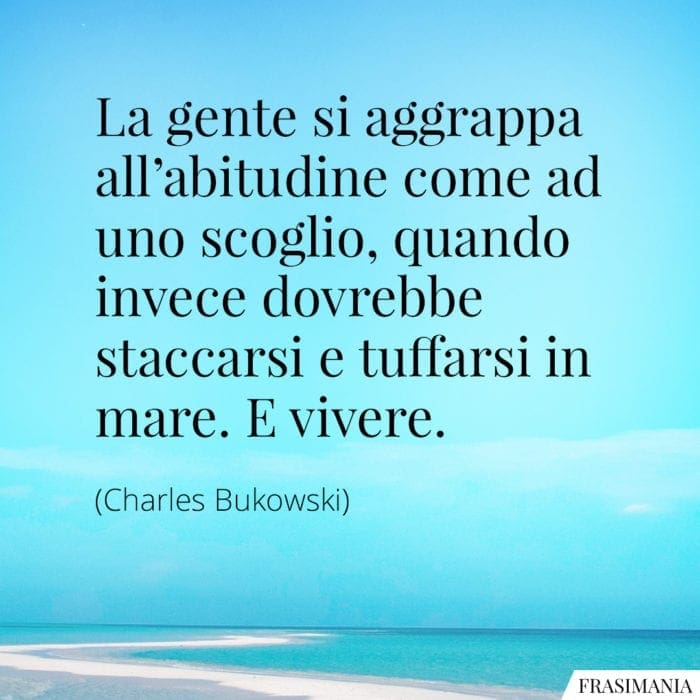
- When dealing with people, remember you are not dealing with creatures of logic, but with creatures bristling with prejudice and motivated by pride and vanity.
Quando hai a che fare con le persone, ricorda che non hai a che fare con creature mosse dalla logica, ma con creature piene di pregiudizi e motivate dall’orgoglio e dalla vanità.
(Dale Carnegie) - People confuse ego, lust, insecurity with true love.
Le persone confondono l’ego, la lussuria e l’insicurezza con il vero amore.
(Simon Cowell) - Most people spend more time and energy going around problems than in trying to solve them.
Molte persone usano più energie per parlare dei problemi di quante non ne utilizzino per risolverli.
(Henry Ford) 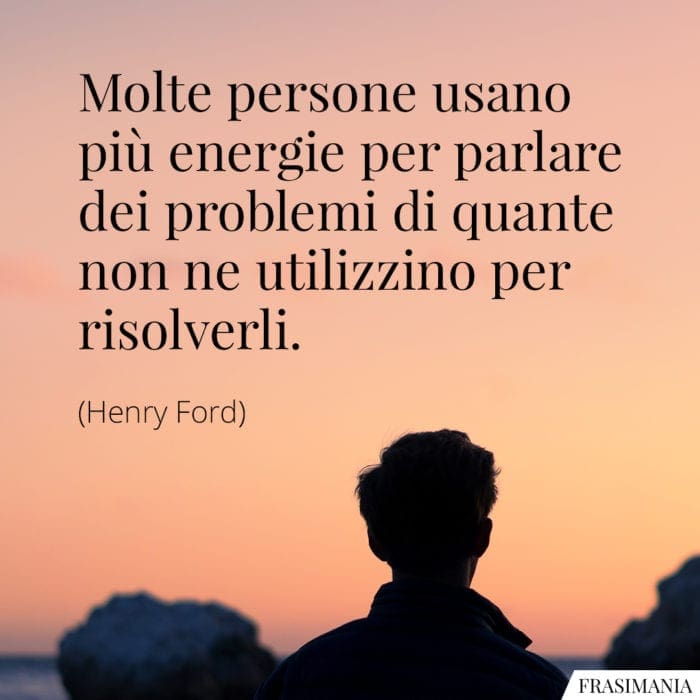
- Whenever people listen to one another humbly and openly, their shared values and aspirations become all the more apparent. Diversity is no longer seen as a threat, but as a source of enrichment.
Ogni volta che le persone si ascoltano l’un l’altra umilmente e apertamente, i loro valori condivisi e le loro aspirazioni diventano ancora più evidenti. La diversità non viene più vista come una minaccia, ma come una fonte di arricchimento.
(Papa Francesco) - A man is nothing but the series of his actions.
Una persona non è altro che l’insieme delle sue azioni.
(Georg Wilhelm Friedrich Hegel) 
- By nature men are similar; by practice men are wide apart.
La natura rende gli uomini simili, la vita li rende diversi.
(Confucio) - It takes one minute to find a special person, one hour to appreciate them, one day to love them, but it takes a whole life to forget them.
Ci vuole un minuto per notare una persona speciale, un’ora per apprezzarla, un giorno per volerle bene, ma tutta una vita per dimenticarla.
(Kahlil Gibran) 
- The world is my country, all mankind are my brethren, and to do good is my religion.
Il mondo è il mio paese, tutta l’umanità sono miei fratelli e fare del bene è la mia religione.
(Thomas Paine) - The general population doesn’t know what’s happening, and it doesn’t even know that it doesn’t know.
La massa non sa cosa sta succedendo nel mondo. E non sa neanche di non saperlo.
(Noam Chomsky) 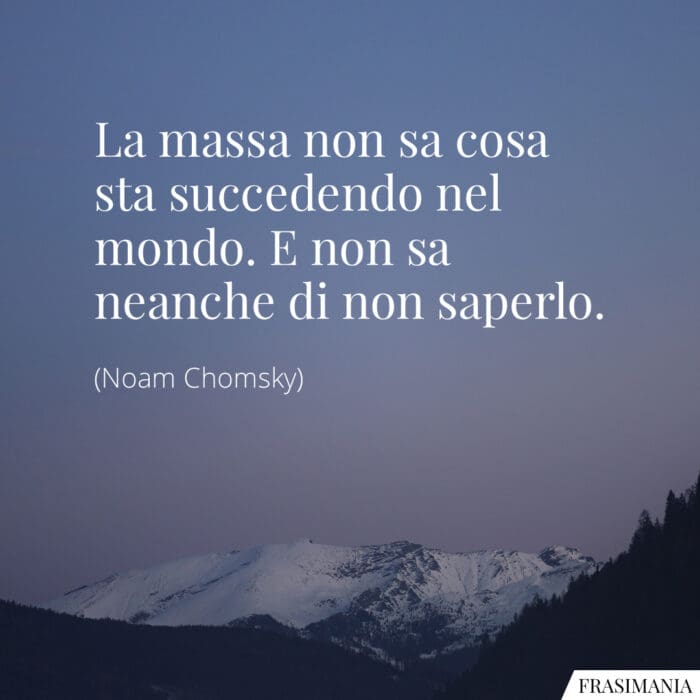
- In every real man, a child is hidden that wants to play.
In ogni vero uomo, si nasconde un bambino che vuole giocare.
(Friedrich Nietzsche) - The more I see men, the more I love dogs.
Quanto più conosco gli uomini, tanto più amo i cani.
(Madame de Sévigné) 
- The best definition of man is: a being that goes on two legs and is ungrateful.
Credo che la migliore definizione che si possa dare dell’uomo sia questa: creatura bipede ed ingrata.
(Fëdor Dostoevskij) - That is just the way with some people. They get down on a thing when they don’t know nothing about it.
Ci sono persone così. Si scagliano contro una cosa quando non la capiscono.
(Mark Twain) - Stay away from negative people. They have a problem for every solution.
Stai lontano dalle persone negative. hanno un problema per ogni soluzione.
(Albert Einstein) 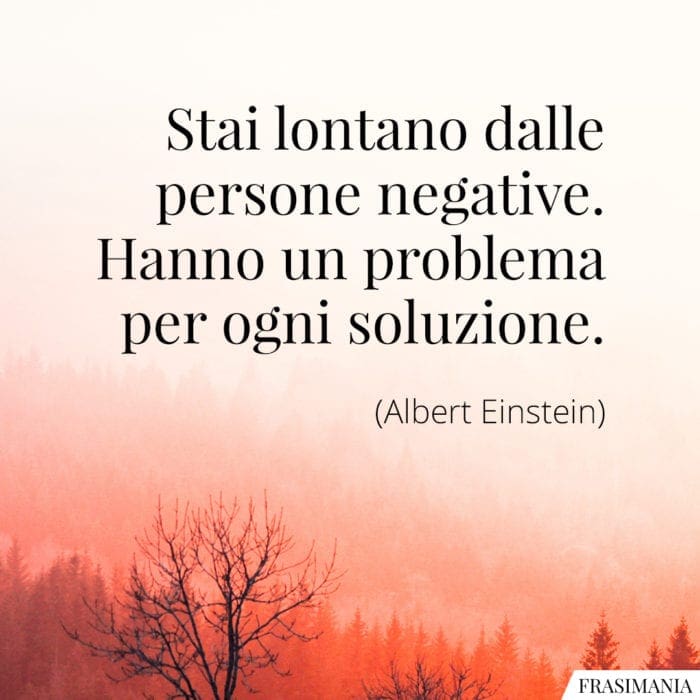
- I like to listen. I have learned a great deal from listening carefully. Most people never listen.
Amo ascoltare. Ho imparato un gran numero di cose ascoltando attentamente. Molte persone non ascoltano mai.
(Ernest Hemingway) - The guns and the bombs, the rockets and the warships, are all symbols of human failure.
Le armi e le bombe, i razzi e le navi da guerra, sono tutti simboli del fallimento umano.
(Lyndon B. Johnson) 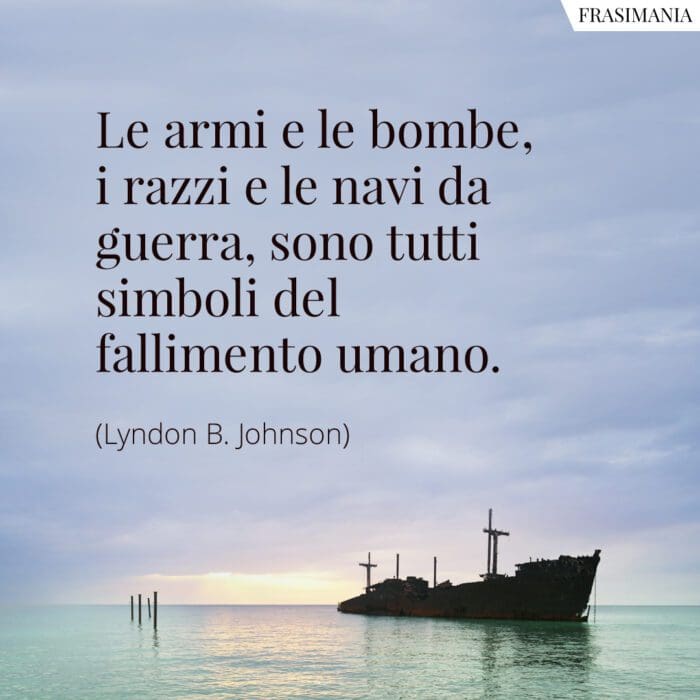
- In nature a repulsive caterpillar turns into a lovely butterfly. But with human beings a lovely butterfly turns into a repulsive caterpillar.
In natura un bruco ripugnante si trasforma in una bella farfalla. Ma con gli esseri umani, è il contrario: una bella farfalla si trasforma in un bruco ripugnante.
(Anton Čechov) - Our most basic common link is that we all inhabit this planet. We all breathe the same air. We all cherish our children’s future. And we are all mortal.
Il nostro legame comune più basilare è che abitiamo tutti su questo pianeta. Respiriamo tutti la stessa aria. Tutti abbiamo a cuore il futuro dei nostri figli. E siamo tutti mortali.
(John Fitzgerald Kennedy) - People are the best show in the world. And you don’t even pay or the ticket.
La gente è il più grande spettacolo del mondo. E non si paga nemmeno il biglietto.
(Charles Bukowski) 
- The world is beautiful, but has a disease called man.
Il mondo è bello, ma ha una malattia chiamata uomo.
(Friedrich Nietzsche) - Taking a new step, uttering a new word, is what people fear most.
Fare un nuovo passo, pronunciare una nuova parola, è ciò che la gente teme di più.
(Fëdor Dostoevskij) - The happiest people aren’t necessarily those who enjoy the best of everything, but those that gain the best of wht they have.
Le persone più felici non sono necessariamente coloro che hanno il meglio di tutto, ma coloro che traggono il meglio da ciò che hanno.
(Khalil Gibran) 
- A broken femur that has healed is evidence that someone has taken time to stay with the one who fell, has bound up the wound, has carried the person to safety and has tended the person through recovery. Helping someone else through difficulty is where civilization starts.
Un femore rotto che è guarito è la prova che qualcuno si è preso del tempo per stare con colui che è caduto, ha legato la ferita, ha portato la persona in sicurezza e ha curato la persona attraverso il recupero. Aiutare qualcun altro a superare le difficoltà è dove inizia la civiltà.
(Margaret Mead) - Everyone you meet knows something you don’t know, but need to know. Learn from them.
Tutti coloro che incontri sanno qualcosa che tu non sai, ma che dovresti sapere. Impara da loro.
(Carl Gustav Jung) 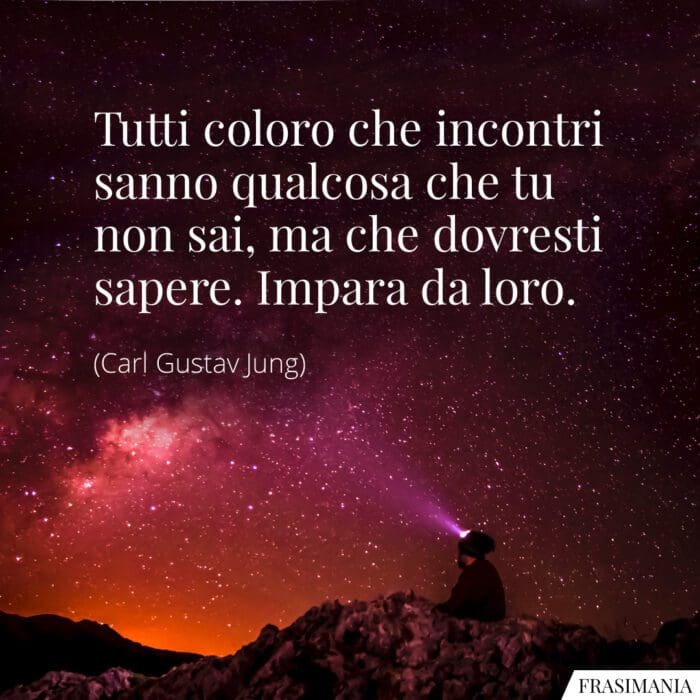
- Science knows no country, because knowledge belongs to humanity, and is the torch which illuminates the world.
La scienza non conosce nessun paese, perché la conoscenza appartiene all’umanità, ed è la torcia che illumina il mondo.
(Louis Pasteur) - Man is a make-believe animal: he is never so truly himself as when he is acting a part.
L’uomo è un animale che finge, e non è mai tanto se stesso come quando recita.
(William Hazlitt) 
- Earth is my homeland and humanity is my family.
La Terra è la mia patria e l’umanità la mia famiglia.
(Gibran Khalil) - I passed two hundred people and failed to see a human being.
Passai accanto a duecento persone e non riuscii a vedere un solo essere umano.
(Charles Bukowski) - There are basically two types of people. People who accomplish things, and people who claim to have accomplished things. The first group is less crowded.
Ci sono due tipi di persone. Quelle che fanno le cose e quelle che affermano di averle fatte. Il primo gruppo è decisamente meno affollato.
(Mark Twain) 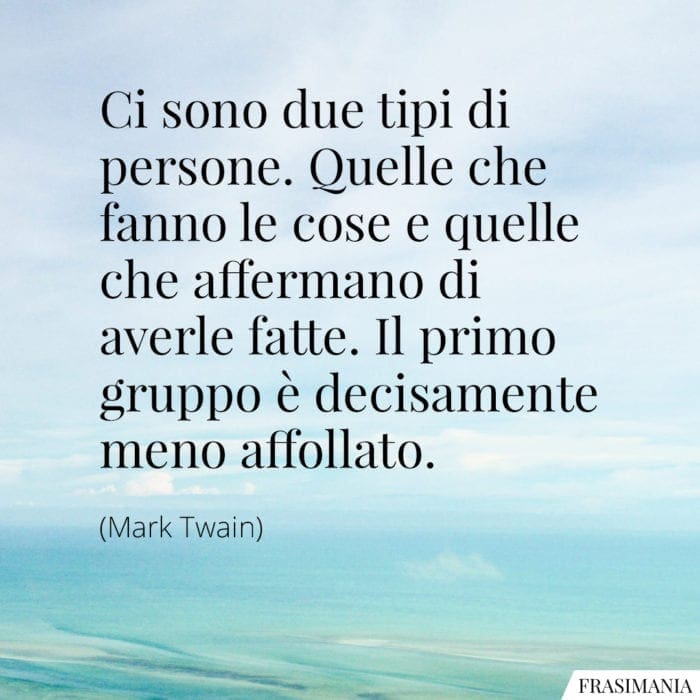
- You call me a misanthrope because I avoid society. You err; I love society. Yet in order not to hate people, I must avoid their company.
Mi chiami misantropo perché evito la società. Ti sbagli: adoro la società. Tuttavia, per non odiare le persone, devo evitare la loro compagnia.
(Caspar David Friedrich) - Of all God’s creatures, there is only one that cannot be made slave of the leash. That one is the cat. If man could be crossed with the cat it would improve the man, but it would deteriorate the cat.
Di tutte le creature di Dio, ce n’è solo una che non può essere resa schiava del guinzaglio. Quello è il gatto. Se l’uomo potesse essere incrociato con il gatto, migliorerebbe l’uomo, ma peggiorerebbe il gatto.
(Mark Twain) 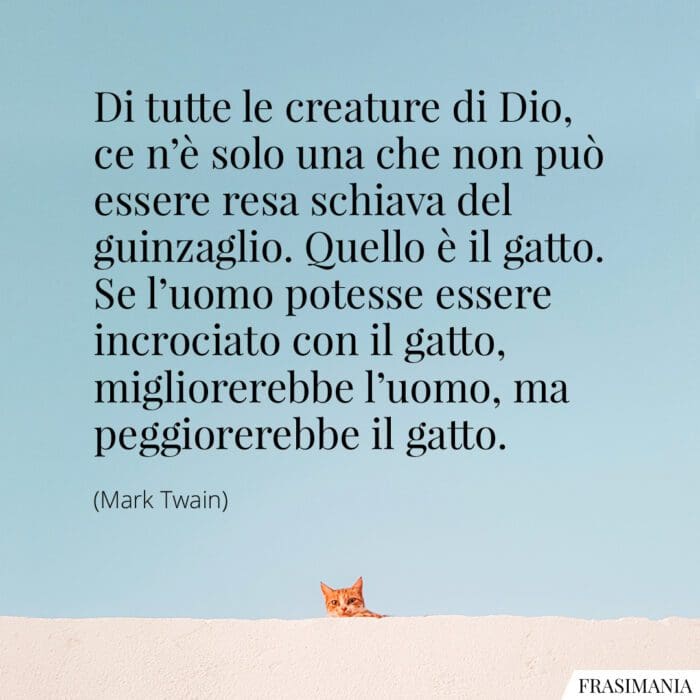
- Men are very strange animals: a mixture of the nervousness of the horse, the stubbornness of a mule and the malice of a camel.
Gli uomini sono animali molto strani: un miscuglio del nervosismo del cavallo, della testardaggine di un mulo e della malizia di un cammello.
(Thomas Henry Huxley) - It is only because of a ridiculous excess of vanity that men attribute themselves a soul of different species than that of animals.
È solo per un eccesso di ridicola vanità che gli uomini si attribuiscono un’anima di specie diversa da quella degli animali.
(Voltaire) 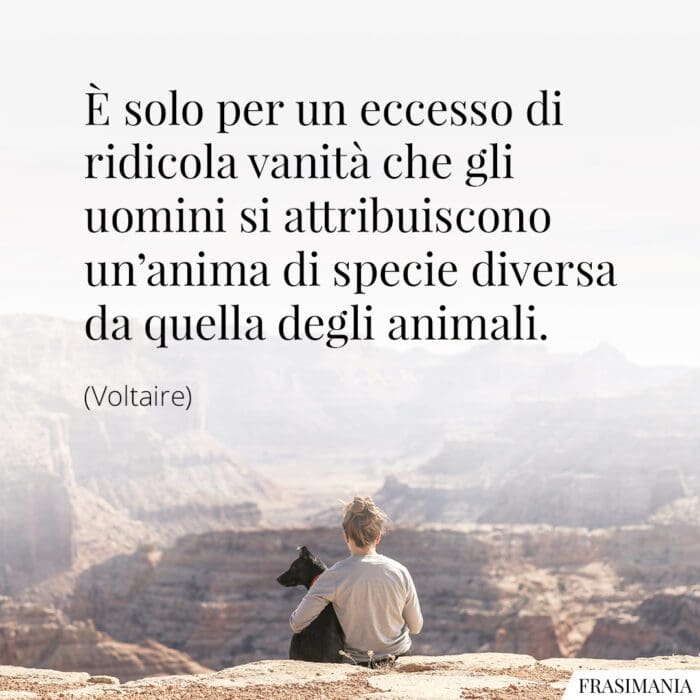
- Of all animals in God’s creation, man is the only one who drinks without being thirsty, eats without being hungry and talks without having something to say.
Di tutti gli animali della creazione, l’uomo è l’unico che beve senza avere sete, mangia senza avere fame e parla senza avere nulla da dire.
(John Steinbeck) - People are strange: they are constantly angered by trivial things, but on a major matter like totally wasting their lives, they hardly seem to notice.
Le persone sono strane: sono costantemente arrabbiate per cose banali, ma di una questione importante come sprecare completamente la loro vita, sembrano a malapena accorgersene.
(Charles Bukowski) - The real problem is not whether machines think but whether men do.
La vera domanda non è se le macchine pensano, ma se lo fanno gli uomini.
(Burrhus Skinner) 
- The worst sin toward our fellow creatures is not to hate them, but to be indifferent to them: that’s the essence of inhumanity.
Il peggior peccato verso i nostri simili non è l’odio ma l’indifferenza; questa è l’essenza della disumanità.
(George Bernard Shaw) - All of humanity’s problems stem from man’s inability to sit quietly in a room alone.
Tutti i problemi dell’umanità risiedono nell’incapacità dell’uomo di restarsene seduto, tranquillamente, in una stanza da solo.
(Blaise Pascal) 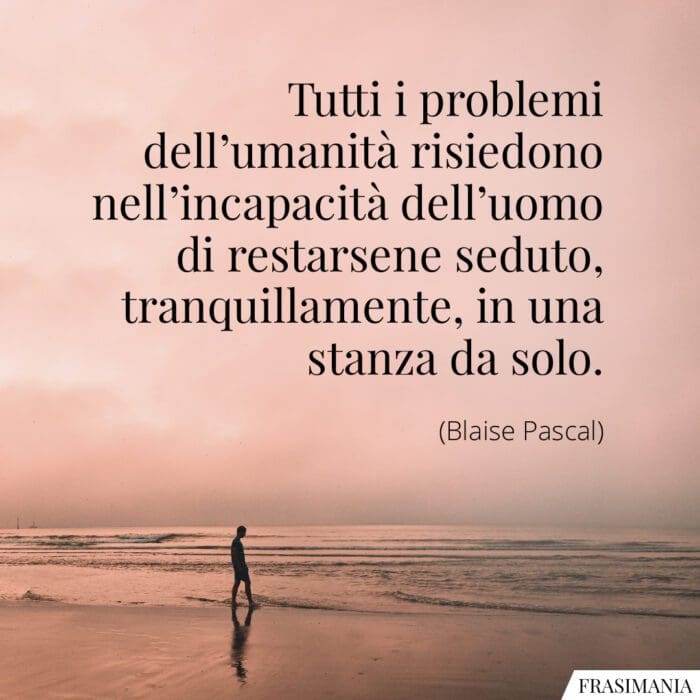
- Human beings are not interested in truth or freedom or justice. This things are uncomfortable and human beings are comfortable with falsehood and slavery and injustice. They wallow in them like pigs.
Agli uomini non interessa né la verità, né la libertà, né la giustizia. Sono cose scomode e gli uomini si trovano comodi nella bugia e nella schiavitù e nell’ingiustizia. Ci si rotolano come maiali.
(Oriana Fallaci) - A person who reads is worth two.
Una persona che legge ne vale due.
(Valentino Bompiani) 
- What is man, when you come to think upon him, but a minutely set, ingenious machine for turning, with infinite artfulness, the red wine of Shiraz into urine.
Che cos’è l’uomo, quando ci pensi, se non una macchina complicata e ingegnosa per trasformare, con sapienza infinita, il rosso vino di Shiraz in orina?
(Karen Blixen) - Everyone thinks of changing the world, but no one thinks of changing himself.
Tutti pensano a cambiare il mondo, ma nessuno pensa a cambiar se stesso.
(Lev Tolstoj) 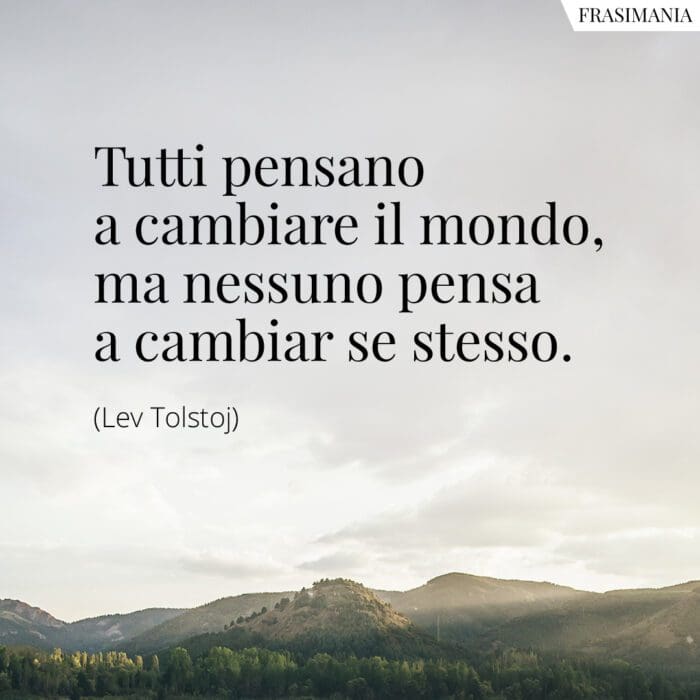
- Wherever the crowd goes run in the other direction. They’re always wrong.
Ovunque vada la folla tu corri in direzione opposta. La folla va sempre nella direzione sbagliata.
(Charles Bukowski) - All men are disappointed in their hopes, and deceived in their expectations.
Tutti gli uomini sono delusi nelle loro speranze, ingannati nella loro attesa.
(Johann Wolfgang von Goethe) - Small is the number of people who see with their eyes and think with their minds.
Poche sono le persone che vedono con i loro occhi e pensano con la loro testa.
(Albert Einstein) 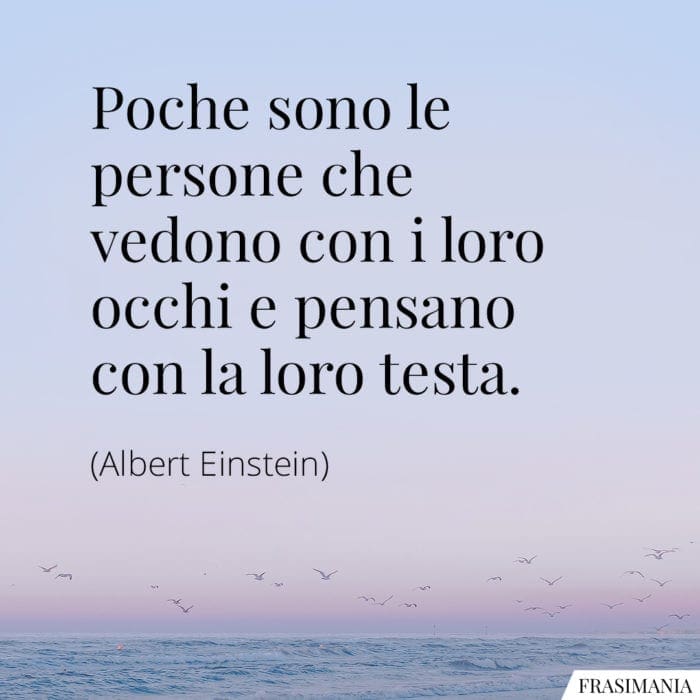
- I have one problem, I don’t hate people. They disgust me and I want to get away from them. I do not have hatred. I have an escape mechanism.
Ho un problema, non odio le persone. Mi fanno schifo e voglio starci lontano. Non le ho odio. Ho un meccanismo di fuga.
(Charles Bukowski) - Man is so made that when anything fires his soul, impossibilities vanish.
L’uomo è fatto in modo tale che, se qualcosa accende la sua anima, l’impossibile svanisce.
(Jean de La Fontaine) - Care about what other people think and you will always be their prisoner.
Preoccupati di ciò che pensano gli altri e sarai sempre loro prigioniero.
(Lao Tzu) 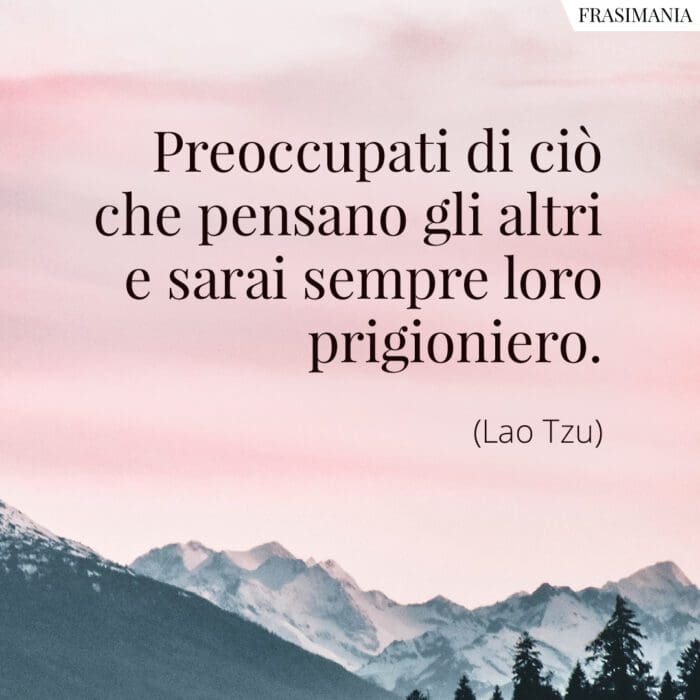
- No matter what people tell you, words and ideas can change the world.
Indipendentemente da ciò che la gente ti dice, parole e idee possono cambiare il mondo.
(Robin Williams) - People do not seem to realise that their opinion of the world is also a confession of their character.
Le persone non sembrano accorgersi che la loro opinione del mondo è anche una confessione del loro carattere.
(Ralph Waldo Emerson) 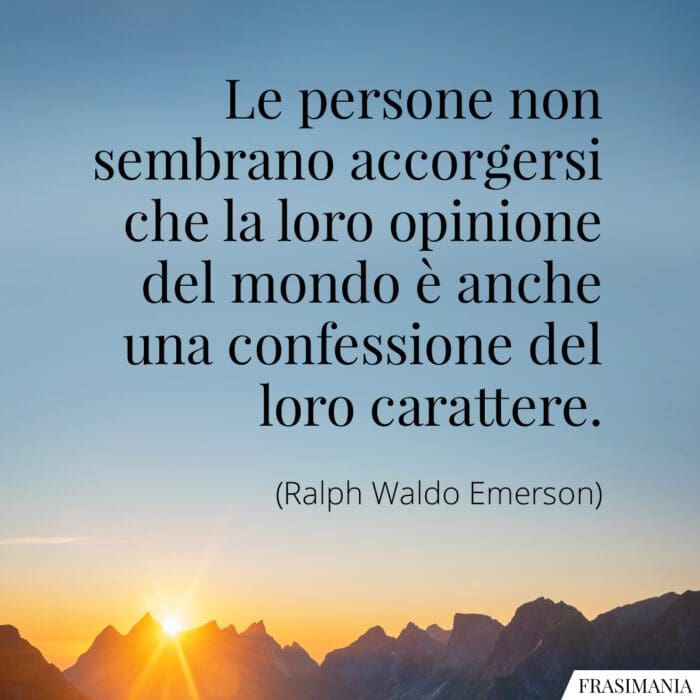
- Most of the luxuries and many of the so-called comforts of life are not only not indispensable, but positive hindrances to the elevation of mankind.
La maggior parte dei lussi, e molte delle cosiddette comodità della vita, non solo non sono indispensabili, ma sono autentici ostacoli per l’elevazione dell’umanità.
(Henry David Thoreau) - Tell a man that there are 400 billion stars and he’ll believe you. Tell him a bench has wet paint and he has to touch it.
Di’ a un uomo che ci sono 400 miliardi di stelle e lui ti crederà. Digli che una panchina ha la vernice fresca e lui dovrà toccarla.
(Steven Wright) - You can tell a lot about a person by the way he/she handles these three things: a rainy day, lost luggage, and tangled Christmas tree lights.
Puoi capire molto di una persona da come gestisce queste tre cose: una giornata piovosa, un bagaglio smarrito e delle luci di Natale ingarbugliate.
(Maya Angelou) 
- Man is the only creature that consumes without producing. He does not give milk, he does not lay eggs, he is too weak to pull the plough, he cannot run fast enough to catch rabbits. Yet he is lord of all the animals. He sets them to work, he gives back to them the bare minimum that will prevent them from starving, and the rest he keeps for himself.
L’uomo è l’unica creatura che consuma senza produrre. Egli non dà latte, non fa uova, è troppo debole per tirare l’aratro, non può correre abbastanza velocemente per prendere conigli. E tuttavia è il re di tutti gli animali. Li mette al lavoro, restituendogli il minimo indispensabile per evitargli di morire di fame, e il resto lo tiene per sé.
(George Orwell) - Man as an individual is a genius. But men in the mass form the headless monster, a great, brutish idiot that goes where prodded.
L’uomo individualmente è un genio. Ma gli uomini, nella massa, formano un mostro senza testa, un grande idiota che va dove è indirizzato.
(Charlie Chaplin) 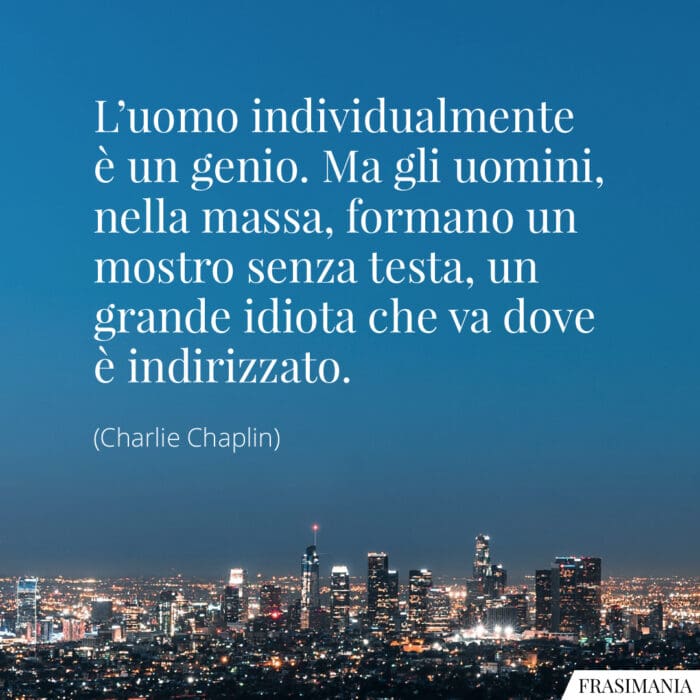
- Most people are other people. Their thoughts are someone else’s opinions, their lives a mimicry, their passions a quotation.
La maggior parte delle persone sono altre persone. I loro pensieri sono opinioni di qualcun altro, la loro vita un’imitazione, le loro passioni una citazione.
(Oscar Wilde) - History teaches us that man learns nothing from history.
Tutto ciò che l’uomo ha imparato dalla storia, è che dalla storia l’uomo non ha imparato niente.
(Georg Wilhelm Friedrich Hegel) 
- There is something in the human spirit that will survive and prevail, there is a tiny and brilliant light burning in the heart of man that will not go out no matter how dark the world becomes.
C’è qualcosa nello spirito umano che sopravviverà e prevarrà, c’è una piccola e brillante luce accesa nel cuore dell’uomo, che non si spegnerà, non importa quanto oscuro il mondo diventi.
(Lev Tolstoj) - There are no uninteresting things, only uninterested people.
Non ci sono cose non interessanti, solo persone non interessate.
(Gilbert Keith Chesterton) - Mass society does not want culture, but only entertainment.
La società di massa non vuole cultura, ma svago.
(Hannah Arendt) 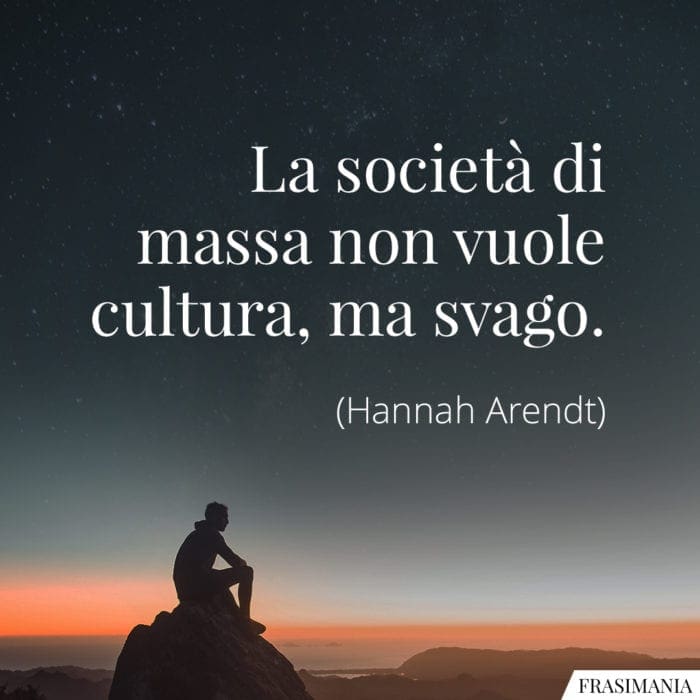
- Man is what he believes.
L’uomo è ciò in cui crede.
(Anton Čechov) - Human beings are not born once and for all on the day their mothers give birth to them, life obliges them over and over again to give birth to themselves.
Gli esseri umani non nascono sempre il giorno in cui le loro madri li danno alla luce, la vita li costringe ancora molte altre volte a partorirsi da sé.
(Gabriel García Márquez) - The longer I live, the more convinced I am that this planet is used by other planets as a lunatic asylum.
Più vivo, più sono convinto che questo pianeta sia usato da altri pianeti come manicomio dell’universo.
(George Bernard Shaw) 
- If men could only know each other, they would neither idolize nor hate.
Se solo gli uomini potessero conoscersi l’un l’altro, non idolatrerebbero né odierebbero.
(Elbert Hubbard) - People grow through experience if they meet life honestly and courageously. This is how character is built.
Le persone crescono attraverso l’esperienza se vanno verso la vita onestamente e coraggiosamente. É così che si costruisce il carattere.
(Eleanor Roosevelt) - An inability to stay quiet is one of the conspicuous failings of mankind.
L’incapacità di tacere è uno dei difetti più evidenti dell’umanità.
(Walter Bagehot) 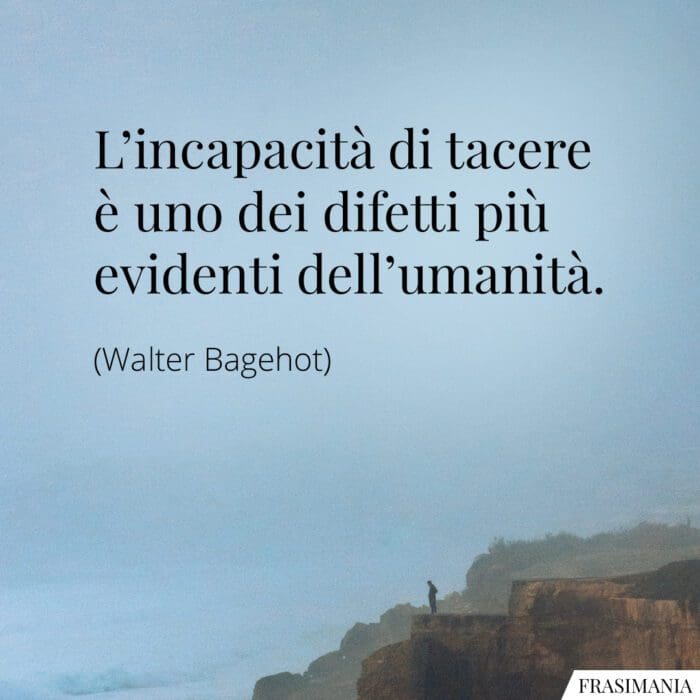
- On the whole, human beings want to be good, but not too good, and not quite all the time.
In generale, gli esseri umani vogliono essere buoni, ma non troppo buoni e non sempre.
(George Orwell) - Humanity takes itself too seriously. It is the world’s original sin. If the cave-man had known how to laugh, History would have been different.
L’umanità si prende troppo sul serio. È il peccato originale del mondo. Se l’uomo delle caverne fosse stato capace di ridere, la storia sarebbe stata diversa.
(Oscar Wilde) - There are two types of people in this world, good and bad. The good sleep better, but the bad seem to enjoy the waking hours much more.
Il mondo si divide in buoni e cattivi. I buoni dormono meglio, ma i cattivi, da svegli, si divertono molto di più.
(Woody Allen) 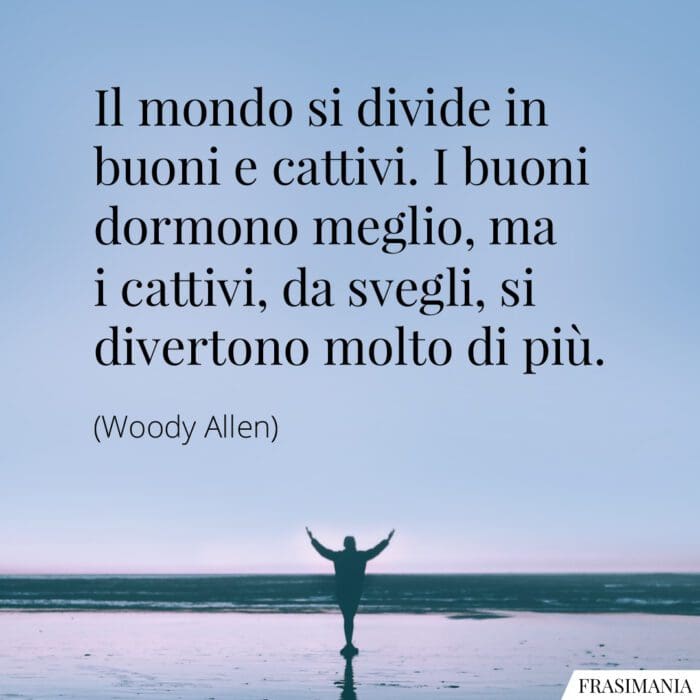
- The deepest urge in human nature is the desire to feel important.
Il bisogno più sentito dalla natura umana è il desiderio di sentirsi importanti.
(John Dewey) - Instead of worrying about what people say of you, why not spend time trying to accomplish something they will admire.
Invece di preoccuparti di ciò che le persone dicono di te, utilizza il tuo tempo cercando di realizzare qualcosa che gli altri possano ammirare.
(Dale Carnegie) - People might not get all they work for in this world, but they must certainly work for all they get.
Le persone possono non avere tutto ciò per cui lavorano in questo mondo, ma di sicuro lavorano per tutto ciò che hanno.
(Frederick Douglass)




